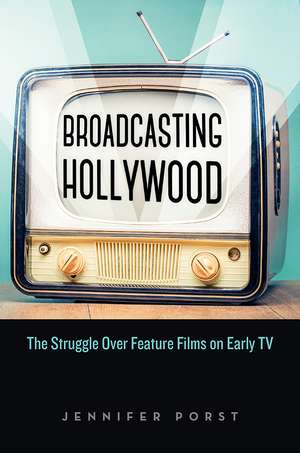Broadcasting Hollywood: The Struggle over Feature Films on Early TV
Autor Jennifer Porsten Limba Engleză Paperback – 17 sep 2021 – vârsta ani
Broadcasting Hollywood: The Struggle Over Feature Films on Early Television uses extensive archival research into the files of studios, networks, advertising agencies, unions and guilds, theatre associations, the FCC, and key legal cases to analyze the tensions and synergies between the film and television industries in the early years of television. This analysis of the case study of the struggle over Hollywood’s feature films appearing on television in the 1940s and 1950s illustrates that the notion of an industry misunderstands the complex array of stakeholders who work in and profit from a media sector, and models a variegated examination of the history of media industries. Ultimately, it draws a parallel to the contemporary period and the introduction of digital media to highlight the fact that history repeats itself and can therefore play a key role in helping media industry scholars and practitioners to understand and navigate contemporary industrial phenomena.
Preț: 269.35 lei
Nou
Puncte Express: 404
Preț estimativ în valută:
51.54€ • 53.95$ • 42.90£
51.54€ • 53.95$ • 42.90£
Carte indisponibilă temporar
Doresc să fiu notificat când acest titlu va fi disponibil:
Se trimite...
Preluare comenzi: 021 569.72.76
Specificații
ISBN-13: 9780813596211
ISBN-10: 0813596211
Pagini: 250
Dimensiuni: 156 x 235 x 33 mm
Greutate: 0 kg
Editura: Rutgers University Press
Colecția Rutgers University Press
ISBN-10: 0813596211
Pagini: 250
Dimensiuni: 156 x 235 x 33 mm
Greutate: 0 kg
Editura: Rutgers University Press
Colecția Rutgers University Press
Notă biografică
JENNIFER PORST is an assistant professor of media arts at the University of North Texas in Denton. Her work has appeared in Film History, Television & New Media, Hollywood and the Law, and the Routledge Companion to Media Industries. Her co-edited collection, Very Special Episodes: Televising Industrial and Social Change, is forthcoming.
Cuprins
List of Abbreviations
Introduction: Media Disruption and Convergence
1 Systems of Authority and Evaluation
2 Exhibition, Audiences, and Media Consumption
3 Contracts, Rights, Residuals, and Labor
4 Roy Rogers, Gene Autry, and the Intervention of the Courts
5 Antitrust, Market Dominance, and Emerging Media
6 Feature Films Make Their Way to Television
Conclusion: Disrupting a Big Market Can Be Bumpy
Acknowledgments
Abbreviations Used in Notes
Notes
Bibliography
Index
Introduction: Media Disruption and Convergence
1 Systems of Authority and Evaluation
2 Exhibition, Audiences, and Media Consumption
3 Contracts, Rights, Residuals, and Labor
4 Roy Rogers, Gene Autry, and the Intervention of the Courts
5 Antitrust, Market Dominance, and Emerging Media
6 Feature Films Make Their Way to Television
Conclusion: Disrupting a Big Market Can Be Bumpy
Acknowledgments
Abbreviations Used in Notes
Notes
Bibliography
Index
Recenzii
"Broadcasting Hollywood unpacks a convoluted postwar industrial trail to presciently detail the complexities of Hollywood and TV's deep, awkward, but ultimately long-lasting affiliation. Dispensing with the idea of a studio-vs-network throw-down, Jennifer Porst shows how historical change is driven instead by the interactions of multiple stakeholders and intermediaries. This book shows why film histories must reckon with intermedia, and helps push reductive contemporary theories of convergence, transmedia, and disruption off their lazy perches as one-stop explanations for the digital era. A must-read for those interested in film history, digital media, and media industries."
"Drawing on a trove of unexplored archival sources, Jennifer Porst has written a brilliant new addition to the field of media industry studies. Focused on the past but with revealing insights about the present—and future—Broadcasting Hollywood should be required reading for media students and researchers across film, television, and digital media."
"A compelling and incisive argument that to understand media convergence today we need to explore the past. Porst brings alive all that was at stake in the first real disruption of Hollywood. Part courtroom drama, part detective story, Broadcasting Hollywood brings to life current debates between studios, networks, creatives, the government. Want to prepare for the future of media? Read this book."
Descriere
Broadcasting Hollywood uses extensive archival research to analyze the tensions and synergies between the film and television industries in the early years of television. It draws parallels to today and the introduction of digital media to highlight how history can play a key role in helping media industry scholars and practitioners understand and navigate contemporary industrial phenomena.
